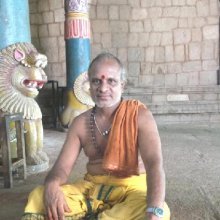Siddhanatha, Siddhanātha: 5 definitions
Introduction:
Siddhanatha means something in Hinduism, Sanskrit. If you want to know the exact meaning, history, etymology or English translation of this term then check out the descriptions on this page. Add your comment or reference to a book if you want to contribute to this summary article.
Images (photo gallery)
In Hinduism
Shaivism (Shaiva philosophy)
Source: Wisdom Library: ŚaivismSiddhanātha (सिद्धनाथ) was the teacher of Amara, who was one of the twelve princes born to Kuṃkumā, consort to Mīnanātha, who is the incarnation of Siddhanātha in the fourth yuga, belonging to the Pūrvāmnāya (‘eastern doctrine’) tradition of Kula Śaivism, according to the Ciñcinīmatasārasamuccaya. Siddhanātha incarnates as a Kaula master in each of the four yugas. Amara was one of the six princes having the authority to teach.

Shaiva (शैव, śaiva) or Shaivism (śaivism) represents a tradition of Hinduism worshiping Shiva as the supreme being. Closely related to Shaktism, Shaiva literature includes a range of scriptures, including Tantras, while the root of this tradition may be traced back to the ancient Vedas.
Shaktism (Shakta philosophy)
Source: Google Books: Manthanabhairavatantram1) Siddhanātha (सिद्धनाथ) obtained the Kaula teaching from Kaulinī, according to the Manthānabhairavatantra, a vast sprawling work that belongs to a corpus of Tantric texts concerned with the worship of the goddess Kubjikā.—Accordingly, “[...] When invited by the goddess, Śambhu came (and took) refuge (in her). Thus he who is Siddhanātha is you (O god) in the primordial sacred seat (ādyapīṭha) in the Sky (where) Kaulinī revealed all the Kaula (teaching) to him. Then he became (a god with a) divine body and went along with the goddess to the very holy (mahāpuṇya) place (where they were to enjoy love) games. Adorned with the sea and other (such beautiful sites) and possessing seven districts (viṣaya), it was called the venerable Kāmākhya”.
Note: According to the Ṣaṭsāhasrasaṃhitā, the god in the form of Siddhanātha, also called Piṅgalanātha, descended into the world on “the northern bank of the milky ocean”.—The text simply adds that: “The virgin Umā, daughter of Dakṣa (Dākṣāyaṇī) (lived) there and so an act of grace took place. (Then), he who is the supreme saviour of all people in the city of the triple world came down into the land of Bhārata in four forms (caturmūrti)”.
2) Siddhanātha (सिद्धनाथ) is the name of a Master associated with the Pīṭha named Tripurottara, according to the Kulakriḍāvatāra, a text paraphrased by Abhinavagupta in his Tāntrāloka.—The lineage (ovalli) Bodhi is associated with the following:—Prince: Amara; Master: Siddhnātha; Pīṭha: Tripurottara; Ghara (house): Paṭṭilla; Pallī (village): Dakṣiṇāvrata; Town: Ḍohāla; Direction: south; Grove: Kambili; Vow-time: 12 years; Mudrā: right thumb; Chummā: “Beyond the End of the Twelve”.
3) Siddhanātha (सिद्धनाथ) (=Siddhānandanātha) is another name for Vaṭapura (or Candrapurīśa)—one of the Sixteen Siddhas according to the Kubjikānityāhnikatilaka: a derative text drawing from Tantras and other sources such as the Ṣaṭsāhasrasaṃhitā.—These sixteen spiritual teachers represent the disciples of the Nine Nāthas who propagated the Western Transmission noted in the Kubjikā Tantras.—Vaṭapura is the Caryā name of this Nātha (i.e., the public name the Siddha uses when living as a wandering renouncer). He is alternatively known as Siddha, Siddhanātha or Siddhānandanātha according to the Siddhakhaṇḍa.

Shakta (शाक्त, śākta) or Shaktism (śāktism) represents a tradition of Hinduism where the Goddess (Devi) is revered and worshipped. Shakta literature includes a range of scriptures, including various Agamas and Tantras, although its roots may be traced back to the Vedas.
Languages of India and abroad
Sanskrit dictionary
Source: Cologne Digital Sanskrit Dictionaries: Aufrecht Catalogus Catalogorum1) Siddhanātha (सिद्धनाथ) as mentioned in Aufrecht’s Catalogus Catalogorum:—Tulādānaprakaraṇa.
2) Siddhanātha (सिद्धनाथ):—author of Abhedakārikāḥ. Quoted by Utpala in Spandapradīpikā.
Source: Cologne Digital Sanskrit Dictionaries: Monier-Williams Sanskrit-English DictionarySiddhanātha (सिद्धनाथ):—[=siddha-nātha] [from siddha > sidh] m. Name of author
[Sanskrit to German]
Sanskrit, also spelled संस्कृतम् (saṃskṛtam), is an ancient language of India commonly seen as the grandmother of the Indo-European language family (even English!). Closely allied with Prakrit and Pali, Sanskrit is more exhaustive in both grammar and terms and has the most extensive collection of literature in the world, greatly surpassing its sister-languages Greek and Latin.
See also (Relevant definitions)
Partial matches: Natha, Siddha.
Starts with: Siddhanathavatara.
Query error!
Full-text (+138): Kunkuma, Siddhanathavatara, Vijahuti, Khakulanatha, Vijita, Mangalajyoti, Vimala, Kamanga, Tuladanaprakarana, Ajita, Khagendranatha, Kurmanatha, Sushobha, Meshanatha, Abhedakarika, Amarapada, Gundikanatha, Khagendra, Yoga, Om.
Relevant text
Search found 11 books and stories containing Siddhanatha, Siddha-natha, Siddha-nātha, Siddhanātha; (plurals include: Siddhanathas, nathas, nāthas, Siddhanāthas). You can also click to the full overview containing English textual excerpts. Below are direct links for the most relevant articles:
Cidgaganacandrika (study) (by S. Mahalakshmi)
Introduction to the Cidgaganacandrikā
Verse 305 [Offering Cidgaganacandrikā to Kāli by the author] < [Chapter 4 - Fourth Vimarśa]
Hindu Architecture in India and Abroad (by Prasanna Kumar Acharya)
Yasastilaka and Indian culture (Study) (by Krishna Kanta Jandiqui)
Skanda Purana (by G. V. Tagare)
Chapter 301 - Greatness of Siddheśvara (Siddha-īśvara) < [Section 1 - Prabhāsa-kṣetra-māhātmya]
Chapter 59 - Siddheśvara (siddha-īśvara-liṅga) [2] < [Section 2 - Caturaśīti-liṅga-māhātmya]
Chapter 48 - The Description of Somanātha < [Section 2 - Kaumārikā-khaṇḍa]
Varahi Tantra (English Study) (by Roberta Pamio)
Chapter 18 - The Āmnāyas (traditions), Continued < [Summary of the Vārāhī Tantra]
Chapter 16 - Paścimāmnaya (Western Tradition) < [Summary of the Vārāhī Tantra]
Srila Gurudeva (The Supreme Treasure) (by Swami Bhaktivedanta Madhava Maharaja)
Birthplace of Śrīla Gurudeva < [Chapter 1.2 - Śrīla Gurudeva’s Pūrvāśrama]
